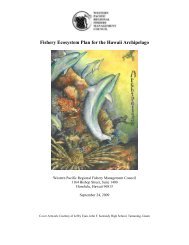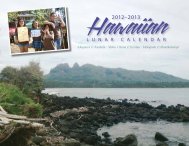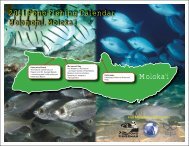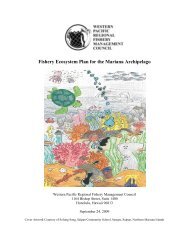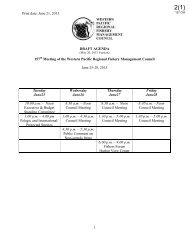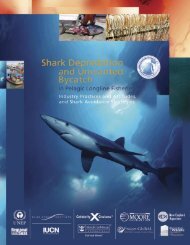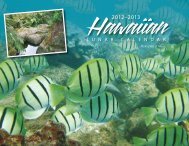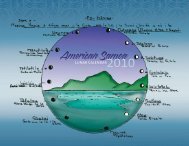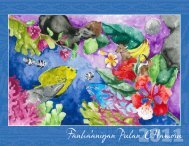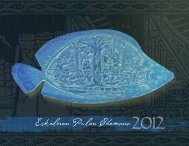PROCEEDINGS OF THE FOuRTH INTERNaTIONal FISHERS FORum
PROCEEDINGS OF THE FOuRTH INTERNaTIONal FISHERS FORum
PROCEEDINGS OF THE FOuRTH INTERNaTIONal FISHERS FORum
Create successful ePaper yourself
Turn your PDF publications into a flip-book with our unique Google optimized e-Paper software.
[ 3. ]<br />
Executive Summary and<br />
Review of Participant Commitments<br />
Ms. Kitty Simonds, Executive Director, Western Pacific Regional Fishery Management Council<br />
The Fourth International Fishers Forum (IFF4) was held<br />
from 12–14 November 2007 in Puntarenas, Costa Rica. The<br />
Western Pacific Regional Fishery Management Council and<br />
Instituto Costarricense de Pesca y Acuicultura (Costa Rica<br />
Fisheries and Aquaculture Institute) were the conference<br />
co-hosts. Technical assistance for program development and<br />
convening the conference was provided by staff from IUCN<br />
(International Union for the Conservation of Nature), the<br />
Inter-American Tropical Tuna Commission and the World<br />
Wide Fund for Nature.<br />
After three days of very intensive sessions and discussions<br />
I believe that we have had a very successful meeting. The<br />
breadth and scale of this Fishers Forum has been the most<br />
ambitious yet. This international meeting of 250 fishermen,<br />
management authorities, seafood industry and retailers,<br />
fishing technology experts, marine ecologists and fisheries<br />
scientists resulted in the active exchange of wide-ranging<br />
perspectives and approaches for responsible longline and<br />
gillnet fisheries, including to minimize sea turtle, seabird,<br />
and marine mammal incidental catch, and ensure that<br />
sharks and their relatives receive needed protection. Forum<br />
participants took an honest look at the state of our artisanal<br />
and industrial fisheries, exchanged ideas on how to improve<br />
them and committed to concrete follow-up actions.<br />
On Day 1, following the opening ceremony and welcomes,<br />
the stage was set in the afternoon by presentations on the<br />
global tuna industry and then on issues related to longline<br />
fisheries in Central and South America, Hawaii, Fiji and<br />
the Pacific Islands and Indonesia. It is clear from these<br />
different presentations that longline fishing is not getting any<br />
easier and that serious challenges lie ahead to maintain the<br />
continuity of these fisheries.<br />
The fisheries of Central and South America do not exist in<br />
mutual isolation, and there are a number of regional and<br />
sub-regional institutional arrangements that were reviewed<br />
by this forum, which considered the relationships between<br />
locally managed small scale domestic pelagic fisheries and<br />
larger fisheries on the high seas in the Eastern Pacific Ocean.<br />
The final sessions on Day 1 considered a new and exciting<br />
topic for the forum series, namely the issue of protected<br />
species interactions in gillnets. This was a very welcome<br />
development, and I hope that participants were encouraged<br />
that there are solutions to gillnet bycatch that can be<br />
implemented with the active collaboration of fishing<br />
communities.<br />
The morning of Day 2 elaborated on the theme of fisheries<br />
sustainability and regional cooperation. This included<br />
separate sessions by industrial and artisanal fishers to<br />
discuss what they felt were best ways to achieve sustainable<br />
livelihoods for both sectors. In the industrial panel there<br />
were issues about resource allocation between purse seiners<br />
and longliners, the canned tuna and sashimi markets, large<br />
and small longliners and coastal states and distant water<br />
fishing states. There was also discussion on fishing capacity,<br />
technological developments, ecosystem approach to fisheries<br />
management and compliance, an issue that appears to be<br />
getting worse not better among the tuna regional fishery<br />
management organizations (RFMOs).<br />
In the artisanal session there was discussion about the<br />
development of a new regional or international artisanal<br />
fishery organization for small scale tuna fishers. This new<br />
organization would be charged with defining the extent of<br />
the small scale fishermen participation in tuna fisheries.<br />
This group also discussed the development of a wide<br />
ranging education program to promote global awareness<br />
of artisanal fishing, information exchange, especially on<br />
bycatch mitigation technology and resource management<br />
information. There was also consideration of adopting a<br />
Code of Conduct for Artisanal Fishers.<br />
The afternoon of Day 2 was what I personally consider<br />
the core of the IFF series, namely the technical sessions<br />
on protected species mitigation and longline fisheries.<br />
The seabird session focused on increased collaboration<br />
amongst the longline fisheries of Central and South<br />
American countries to address seabird interactions in<br />
longline fisheries and about exporting lessons learned<br />
Executive Summary and Review of Participant Commitments<br />
5



